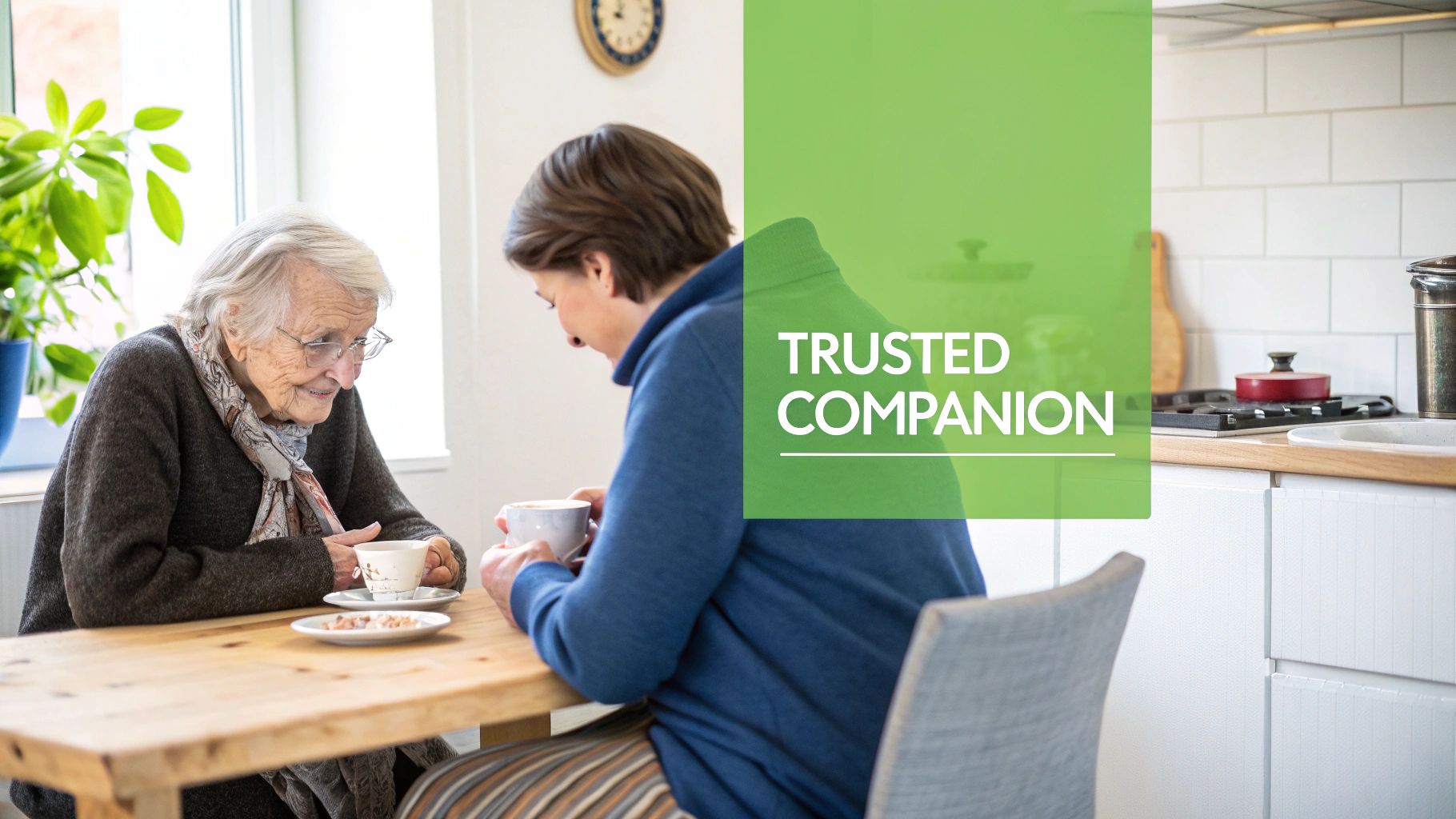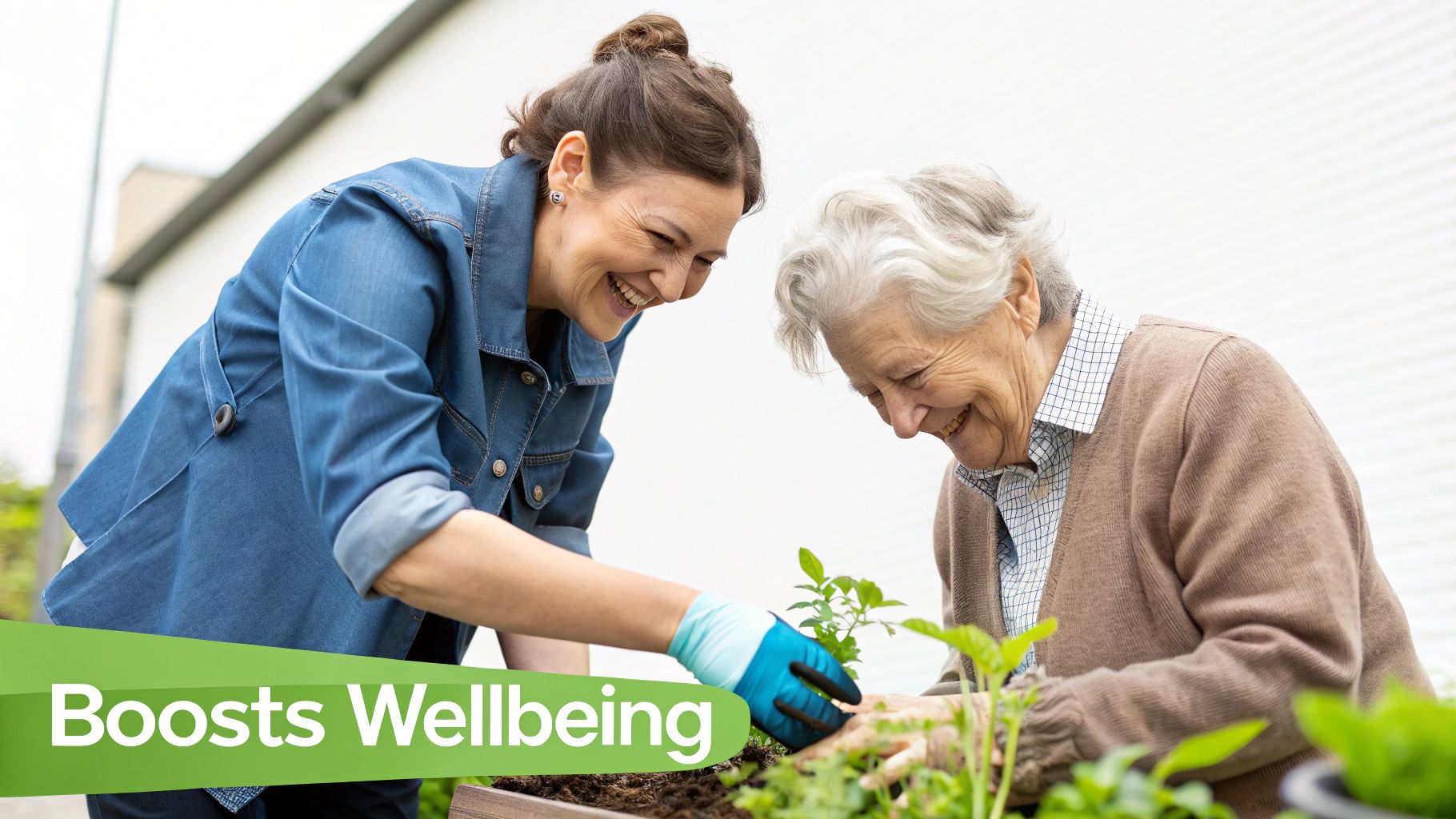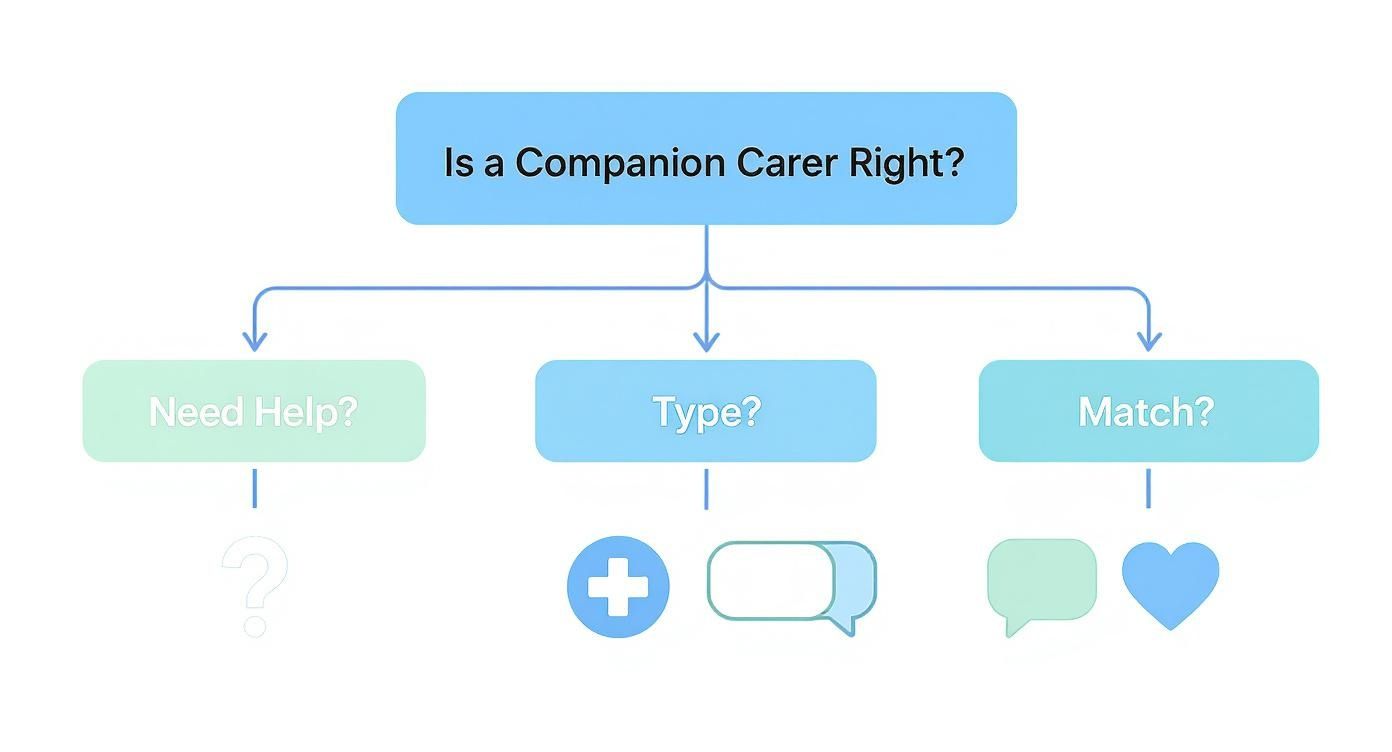When you think about care for older people, what comes to mind? For many, it's the practical, hands-on help with things like getting dressed or managing medication. But there's another kind of support that's just as vital, one that focuses on the heart and mind: companionship.
Companionship services offer personalised, non-medical support that centres on emotional well-being and social connection. Think of it less as a formal care duty and more like having a trusted friend who brings warmth, conversation, and a bit of practical help into a person's day. It's all about tackling loneliness and making everyday life brighter.
What Do Elderly Companionship Services Actually Involve?

The term 'care' often makes us picture medical tasks, but companionship services for elderly people fill a different, equally crucial role. They’re built on the simple but powerful idea that we all need meaningful human connection to live a happy and healthy life, no matter our age.
This kind of support goes far beyond a simple checklist of tasks. It's about nurturing a genuine bond that helps push back the feelings of isolation many older adults face. A companion carer becomes a familiar, friendly face—someone to share stories with over a cup of tea, enjoy a favourite hobby with, or take a gentle walk to the local park alongside.
More Than Just a Helping Hand
Think of it like tending to a garden. One person might just water the plants—a necessary job, of course. But a truly dedicated gardener does more; they tend to the soil, clear away weeds, and make sure each plant gets the right amount of sunlight. This approach helps the plant flourish, not just survive.
Companionship care is like that second gardener. It provides the holistic, enriching support that helps an older person thrive emotionally and socially.
As families have become more geographically spread out, those traditional support networks have changed, sometimes leaving seniors feeling disconnected. Professional companionship steps in to help rebuild those essential social bridges, bringing life and laughter back into the home.
The real purpose of elderly companionship isn't just to be present; it's to be a positive and engaging presence. It's about bringing joy, conversation, and a sense of connection into daily life, which in turn helps foster independence and boost self-esteem.
A Quick Look at What Companionship Services Include
To make it clearer, here’s a simple breakdown of the kinds of activities involved in companionship care. Notice how the focus is always on social and emotional well-being, rather than complex medical or personal care tasks.
| Type of Support | Examples of Activities | Primary Goal |
|---|---|---|
| Social Interaction | Sharing stories, discussing the news, playing cards or board games, listening to music, looking through photo albums. | To provide stimulating conversation and genuine friendship, reducing feelings of loneliness. |
| Shared Activities & Hobbies | Accompanying to social clubs, visiting a local café, going for a walk, helping with gardening or knitting. | To encourage participation in enjoyable activities and maintain community connections. |
| Light Household Help | Assisting with meal preparation, light tidying up, running errands like shopping or posting letters. | To ease the burden of daily chores, making home life more manageable and enjoyable. |
These activities are all designed to support a person's independence and quality of life in a friendly, relaxed way.
A Growing Need in the UK
The rising demand for these services paints a clear picture of a major shift in our society. The UK's domiciliary care sector, which includes companionship, is now valued at around £6.7 billion. The market has seen huge growth over the last five years, largely because of our ageing population.
As of mid-2022, nearly 19% of the UK population was aged 65 or over—a massive jump from just 13% back in 1972. You can explore more data on this growing sector on platforms like Ibis World.
This demographic trend shows exactly why services that address loneliness are no longer a 'nice-to-have' but a fundamental part of compassionate modern care. It's a collective realisation that our emotional health is every bit as important as our physical health.
Ultimately, companionship services for elderly people are about creating a supportive and enriching environment right at home. It's about making sure people feel valued, heard, and socially connected, helping them live more fulfilling and independent lives.
The True Impact of Companionship on Senior Wellbeing

When we talk about care for older people, we often focus on the practical side of things. But there’s another element that’s just as crucial: companionship. It's the simple act of regular, friendly social interaction, and its power to influence health is truly profound.
These visits are more than just a chat over a cup of tea. They provide vital emotional support, a bit of mental stimulation, and the gentle encouragement someone might need to stay active and engaged. Think of a companion carer less as a formal helper and more like a trusted friend or a good neighbour who pops round. This simple human connection can spark a real change, creating positive ripple effects that touch every part of a person's life.
| Benefit Area | Positive Outcome |
|---|---|
| Mental and Emotional | Reduced anxiety and uplifted mood |
| Cognitive | Sharpened memory and attention |
| Physical | Improved mobility and strength |
These three areas don't work in isolation; they’re woven together. Better mood leads to more energy for a short walk, which in turn helps keep the mind sharp. It's this holistic approach that is making companion care an increasingly recognised and essential service for older people across the UK.
So, what does this look like in the real world? It could be planning a weekly session in the garden, accompanying someone to their local community centre to catch up with friends, or even just sharing a love of books. It’s all about connection.
Improving Emotional Health
Sometimes, all a person needs is a listening ear to feel seen and valued. A companion who takes the time to listen with genuine empathy can make an enormous difference, helping to lower stress and lift spirits.
A recent survey found that 73% of seniors reported a significant improvement in their mood after starting companionship visits.
When you combat feelings of anxiety or depression, you open the door to so much more. A person who feels connected and supported is far more likely to have the confidence to try new things, creating a wonderful cycle of growing independence and self-esteem.
Boosting Cognitive Function
Keeping the mind active is just like exercising a muscle. Friendly chats, sharing stories, or playing a simple game are brilliant workouts for the brain. Companions can introduce fun and gentle ways to keep cognitive skills sharp.
These activities don't need to be complicated. They might include:
- Playing card games to jog the memory.
- Discussing the day’s news to encourage comprehension and conversation.
- Working on a jigsaw puzzle together to hone problem-solving skills.
Consistent mental engagement like this helps to maintain neural pathways, which can be a key factor in slowing down age-related cognitive decline.
Supporting Physical Wellbeing
A little nudge from a friendly face can be the perfect motivation to get moving. Companionship often involves activities that gently encourage physical health without feeling like a chore. Accompanying someone on a short, pleasant walk or spending time in the garden can work wonders for cardiovascular health, muscle strength, and balance.
The main physical benefits often include:
- Enhanced muscle tone from light activities like gardening.
- Better balance from guided movements and gentle exercises.
- Increased stamina from building up to short, regular strolls.
This is where you can really see how the different aspects of wellbeing support each other, creating a well-rounded foundation for a healthier, happier life at home.
Providing Peace of Mind for Families
For families, knowing that a loved one has someone checking in on them, providing not just practical support but genuine friendship, is an incredible relief. A companion carer can also be an invaluable source of information, sharing observations about mood or any emerging needs, which gives families a much clearer picture of how their relative is doing.
You can learn more about why companionship is just as important as physical care in our detailed guide. Understanding the different environments where older people live, from their own homes to care homes and senior communities, really shows how tailored social interaction can meet very specific and personal needs.
A Real-World Example of Transformation
Take Mrs Patel, for instance. After her husband passed away, she became increasingly withdrawn and isolated. Her companion started with something simple: sharing a pot of tea and listening to Mrs Patel’s stories about her childhood. Within a few weeks, something shifted. Mrs Patel felt confident enough to join a local art class, rediscovering a passion for painting she hadn't touched in years.
This story perfectly illustrates that companionship is an active, dynamic force for good. It can be the catalyst that helps someone reconnect with their interests, their community, and ultimately, themselves. It builds the emotional resilience needed to navigate life's later chapters with confidence and joy.
What a Professional Companion Carer Really Does
When you first think of a companion carer, you might just picture a friendly face popping in for a chat. While that's part of it, the role is so much more. It’s a carefully considered blend of practical help, emotional reassurance, and genuine friendship, all designed to make daily life safer, easier, and more enjoyable.
So, what does a day in the life of a companion carer actually look like? It’s completely tailored to the person they’re supporting. It could start with a cup of tea and a natter over the morning paper, followed by preparing a light lunch together. The afternoon might bring a gentle stroll through a local park or a lift to visit an old friend. The key is flexibility – the activities are built around what brings your loved one joy and keeps them stimulated.
This support isn't just confined to the four walls of their home, either. A companion can go with them to doctor's appointments, help with the weekly food shop, or drive them to a social club. Having that friendly support gives an older person the confidence to stay connected to their community and the world around them.
Clarifying Professional Boundaries
It's just as important to understand what a companion carer doesn't do. Getting this clear from the start ensures your loved one gets the right support from the right people. The role is strictly non-medical and is quite distinct from that of a personal or clinical carer.
For example, a companion carer will not:
- Administer medication: They can offer a helpful reminder when it's time to take tablets, but they aren't trained or insured to actually administer any prescriptions.
- Provide personal care: Things like bathing, dressing, and help with toileting require the skills of a dedicated personal carer.
- Perform medical procedures: Any task that needs clinical skill—like changing wound dressings or giving injections—is a job for a qualified nurse.
This distinction is all about safety. It ensures every aspect of your loved one's health is managed by someone with the proper training. Companionship is focused on wellbeing and social health, working alongside any medical or personal care plans already in place. You can learn more about how this fits into a bigger picture of how personalised home care supports independent living.
The real heart of companionship isn't about ticking off a list of jobs. It’s about building a genuine connection that helps someone live a fuller, more independent life on their own terms, with a trusted friend right there with them.
The Growing Demand for Domiciliary Support
Across the UK, the need for companion carers and other forms of home support is growing fast. Right now, it's thought that almost a million people receive publicly funded domiciliary care, helping them live safely and happily in their own homes. It’s a huge workforce, with around 809,000 employees dedicated to providing this vital support.
But the sector is under pressure. In England, the job vacancy rate is around 13% – that’s more than four times the national average for all jobs. This highlights just how critical the need for more compassionate, dedicated carers has become. You can read more about domiciliary care workforce statistics in the UK and see the trends for yourself.
Beyond just being a friend, a professional companion also keeps a close eye on the health and safety of the person they support. That's why having knowledge of things like nursing home infection control tips is so important in their role. This commitment to creating a safe, comfortable environment gives families incredible peace of mind, knowing their loved one is in truly capable hands.
How to Find the Right Companionship Service in the UK
Choosing the right companionship services for elderly loved ones is a deeply personal journey. It's not just about ticking boxes; it's about finding a genuine connection that adds a spark to their day. It takes a bit of thought, but with the right approach, you can find a service that feels less like a service and more like a friendship.
The best place to start is with a cup of tea and a good chat with your loved one. What do they actually want? Are they missing those trips to the garden centre, fancy a partner for a game of cards, or just someone to put the world to rights with over the phone?
Think about their personality, too. A lively, sociable person will thrive with a carer who shares that same energy. Someone a bit quieter might prefer a more gentle, calm presence. Jotting down their hobbies, what makes them laugh, and their daily rhythm helps build a picture of the perfect companion.
Beginning Your Search for Reputable Providers
Once you have a clear idea of what you’re looking for, it's time to find providers who can deliver. The first port of call should always be the Care Quality Commission (CQC), the independent regulator for all health and social care in England.
The CQC inspects and rates every provider, giving you an honest, unbiased look at their standards. You should be looking for agencies rated ‘Good’ or ‘Outstanding’ – this is a clear sign that they’re getting things right.
A few other great sources for finding trusted local care include:
- Your Local Council: They often have a directory of approved home care providers in the area.
- Word of Mouth: Don’t underestimate the value of a personal recommendation. Ask friends, neighbours, or even your GP.
- Online Searches: A quick search for "companionship services for elderly near me" will bring up plenty of options, which you can then vet against CQC ratings.
This simple decision tree can help you see if a companion carer is the right path for your family.

Essentially, companionship is perfect for tackling loneliness and boosting well-being, but complex medical needs usually require a different kind of support.
Key Questions to Ask During Consultations
Once you’ve put together a shortlist of potential agencies, it’s time to pick up the phone. This is your chance to get a real feel for how they operate. A compassionate, professional provider will be more than happy to answer all your questions.
The goal here is to find an agency that truly understands that the best companionship is built on a real connection. A successful match is about shared interests and genuine rapport, not just filling a time slot.
To make sure you don't miss anything important, have a list of questions ready. Here are a few must-asks:
- The Matching Process: "How do you match carers to clients? Can we have a say in who comes to visit?"
- Safety and Vetting: "Are all your carers DBS checked? What other background checks do you do?"
- Training and Skills: "What specific training do your carers receive, especially for things like dementia awareness or simply being a good listener?"
- Consistency: "Will my mum have the same person visiting each time? Building a relationship is really important to us."
- Insurance: "Is your agency fully insured? What's the plan if there's ever an emergency?"
- Keeping in Touch: "How do you keep the family in the loop about how things are going?"
- Flexibility: "If our needs change down the line, how easy is it to adjust the care plan?"
Getting clear answers to these questions will tell you a lot about an agency's standards and their commitment to providing truly personal care. When you find a provider who ticks all these boxes, you can feel confident you're making the right choice. To get a broader view of all the options available, take a look at the ultimate guide to care-at-home services for some extra insight.
Understanding the Costs of Companionship Care
Talking about finances is a natural and important part of arranging care for a loved one. When you're considering companionship services for elderly people, you'll want to know what to expect. Let's break down the costs and funding options here in the UK so you can plan with confidence.
Most companionship care is priced by the hour. This model gives you incredible flexibility—you can book a carer for just a couple of hours a week for a chat and a cuppa, or arrange for more significant daily support. The price reflects that dedicated, one-to-one time your loved one receives.
Typical Pricing Structures
So, what does that look like in practice? In the UK, you can generally expect hourly rates for professional companionship to fall somewhere between £20 and £30.
Of course, that figure can shift depending on a few things. Your location plays a part, as costs in London or other big cities are sometimes a bit higher. The time of day can also affect the rate, with evenings, weekends, and bank holidays often costing a little more. Finally, if your loved one needs more specialised support beyond general companionship, that could also adjust the final price.
The most important thing is transparency. A good provider will be upfront about all costs, with no hidden surprises. You should always get a clear, itemised breakdown before making any decisions.
Exploring Funding Options
Many families pay for companionship care privately, but it's always smart to see what financial support might be out there. There are several avenues you can look into to help with the costs.
A great first step is to contact your local council for a free care needs assessment. This is simply a conversation to see what your loved one's needs are and whether they might be eligible for council funding to help pay for their care.
Even if they don't qualify for support from the council, don't stop there. There are other non-means-tested benefits, which means they aren't based on your income or savings.
- Attendance Allowance: This is a big one for anyone over State Pension age who needs help with personal care or supervision because of an illness or disability. It's tax-free, isn't means-tested, and can make a real difference in paying for companionship.
- Personal Independence Payment (PIP): This is for people under State Pension age and serves a similar purpose, helping with the extra costs that come with a long-term health condition.
- Pension Credit: If your loved one has a lower income, this benefit can top it up to a certain level and often opens the door to other types of financial help.
Trying to figure all this out can feel a bit overwhelming, but you're not alone. Organisations like Age UK offer brilliant, free advice to help you navigate the system. They can walk you through what your loved one might be entitled to and even help with the application forms. Getting the finances sorted means you can focus on the most important thing: finding that perfect companion to bring a bit of extra joy into their life.
Why Companionship Is More Important Than Ever
Life today moves at a breakneck speed. It’s a world where families are often spread far and wide, and for many older adults, this new reality has quietly led to an epidemic of loneliness. As children move away for careers and old friendships naturally evolve, the days can become incredibly quiet, making professional companionship services for elderly people a modern-day necessity.
This isn't just a fleeting feeling of being alone; it's a major social shift with very real health implications. The old safety net of tight-knit communities and ever-present family has frayed. Because of this, what was once considered a luxury—a companion—has now become an essential part of maintaining health and happiness for many.
The UK's Shifting Demographics
If you look at the UK's population, the numbers tell a stark story. We're an ageing nation, which is fantastic in many ways, but it also means more people are living longer, often with complex health needs. This highlights a pressing need for care that goes beyond just the physical to address emotional wellbeing too.
This trend isn't slowing down. In fact, projections show an increase of 8.6 million people aged 65 and over in the next 50 years. By 2030, it's expected that more than 15.5 million UK residents will be in this age group, a significant portion of whom will be living with conditions like dementia. If you want to dig deeper into these trends, you can learn more about why the home care industry is a smart investment.
A Modern Solution for a Modern Problem
The recent years have only intensified this sense of isolation, leaving many older people feeling more cut off than ever. It's a heavy burden to carry, and prolonged loneliness can have a devastating impact on both mental and physical health, increasing the risk of depression, anxiety, and even cognitive decline.
This is where professional companionship steps in, offering a direct and effective answer. It’s all about rebuilding those social bridges that are so fundamental to a good life, acting as a powerful preventative measure for overall wellbeing.
Companionship is proactive care. It tackles the root causes of loneliness before they can snowball into more serious health problems, making it a cornerstone of any compassionate, forward-thinking care plan.
By bringing consistent, friendly, and warm interaction back into someone's life, companionship services help restore a sense of routine, purpose, and simple joy. It’s a clear recognition that our emotional health is every bit as important as our physical health, and that everyone, at every age, deserves to feel connected and valued.
Common Questions About Companionship Services
Deciding to welcome a companion into your loved one’s life is a big step, and it’s natural to have a few questions before you commit. Getting clear on the practical side of things often provides the peace of mind you need to feel confident you’re making the right choice. Here are some straightforward answers to the questions we hear most often about companionship services for elderly people.
What Is the Difference Between a Companion and a Personal Carer?
This is probably the most crucial distinction to get your head around. Think of a companion as a friend who’s there to provide social and emotional support. Their time is spent sharing a conversation over a cup of tea, working on a puzzle together, going for a walk in the park, or helping with light tasks like preparing a simple meal.
A personal carer, on the other hand, is trained to help with the physical side of things. Their role involves hands-on support like assisting with bathing and dressing, managing continence care, or helping someone move safely around their home. Both roles are incredibly important, but companionship is all about connection, while personal care focuses on physical wellbeing.
How Are Companions Matched with Clients?
The magic of great companionship lies in the right personality fit. A good agency won’t just send whoever is free; they’ll have a thoughtful matching process. It all starts with getting to know your loved one—their personality, their hobbies, their life story, and what they’d truly enjoy from a companion.
From there, the agency will look for a carer who shares common ground. It might be a mutual love of gardening, a passion for wartime history, or simply a similar, gentle sense of humour. This careful matchmaking is what turns a professional arrangement into a genuine friendship.
The goal is not just to provide a service but to build a relationship. A successful match means your loved one looks forward to every visit, feeling they are spending time with a trusted friend.
Are These Services Only for People Who Live Alone?
Absolutely not. While companionship is a true lifeline for seniors living on their own, the benefits reach much further. For family members who are acting as carers, these services offer a chance for some well-deserved respite. It gives them a break to recharge, knowing their loved one is enjoying some friendly, safe company.
A companion can also bring a fresh energy and new activities into the home, even if a senior lives with their spouse or family. They offer a different kind of conversation and engagement that beautifully complements the support they already receive from loved ones.
At Cream Home Care, we specialise in creating these perfect matches, providing compassionate and reliable companionship that makes a real difference. To find out how we can support your family in Stoke-on-Trent and Newcastle-under-Lyme, visit us at creamhomecare.co.uk or give our friendly team a call today.






